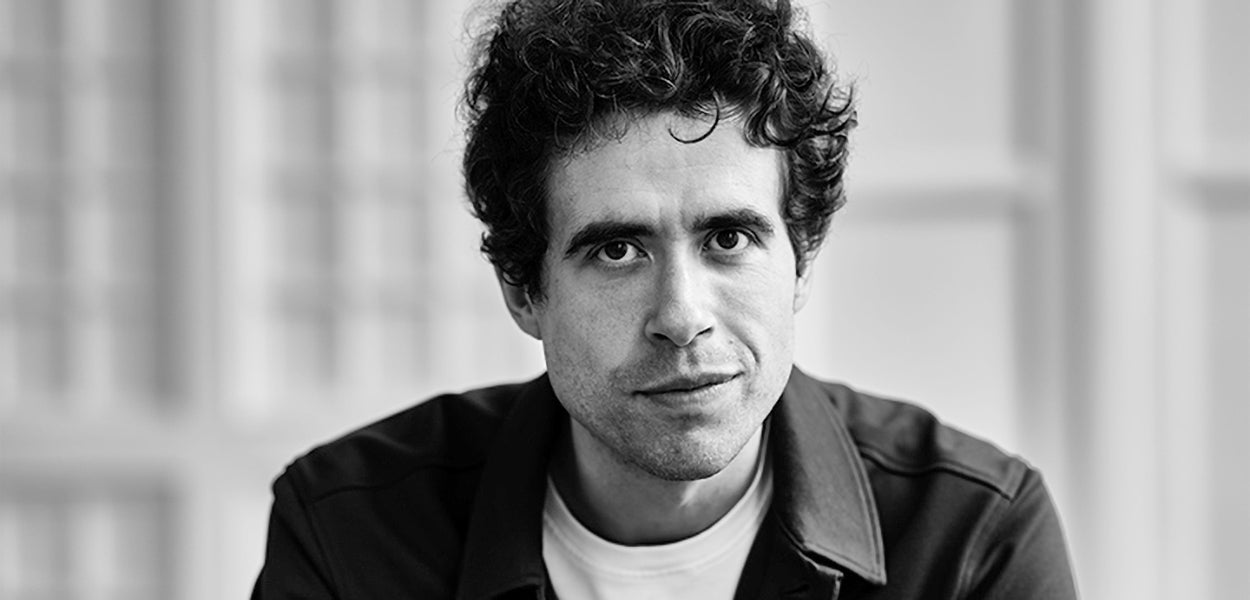(Dutch) text: Shirley Haasnoot
Eighteenth Writer in Residence, philosopher and alumnus Désanne van Brederode, while delivering the Abraham Kuyper Lecture on 19 May, made an unexpected plea: we should wash each other's feet. 'I believe we can hear each other in another way, not with words but serving, kneeling, with a tub, water and a towel. Our hands around the bare feet of the other who happens to come our way.'
To illustrate those words, a tub of water and flower petals appeared on a large screen in the night-blue-lit Aula in the main building. In it, two slender feet with white-painted toenails, were washed by gentle hands.
Abraham Kuyper had concurred with her words
With a lecture that unfolded like a long train of thought, in her signature expressive style, Van Brederode concluded her year as Writer in Residence at VU Amsterdam. Abraham Kuyper, who was known in his time as an endowed literator, could have concurred with her words when she said: 'I believe that careful fantasising, rereading, deleting, rewriting, is a form of very moving, active meditation. I would almost say, praying.'
'Playing is what makes people truly human - delicate, imaginative, free'
As a Writer in Residence, the year for Van Brederode had revolved around Spieltrieb, or play drive, a term coined by German playwright and thinker Friedrich Schiller. According to Schiller, 'playing is what makes people truly human - sensitive, imaginative, free'. And where better to play than at university?
Where one can play, imagination begins, said writer Van Brederode. Where you can slip into the skin of a character, become a strange 'I', by temporarily forgetting yourself, 'You have to sacrifice your own experiences and your good intentions'. Or as the writer Goethe, Schiller's heart friend, put it: 'Die and become.' How that works, Van Brederode explored with students on the bachelor's programme Creative Writing Dutch, which started in September 2024 and now attracts many students.
Rituals can teach us to step out of time once in a while
Professor of Modern Dutch Literature Jacqueline Bel reflected on Van Brederode's words, the new course and the importance of literature and rituals. Urging her students to read and write every day, she said. 'Nulla dies sine linea, freely translated, no day without writing.' When that writing becomes a special moment in the day, tied to a time and location, it can take on the power of a ritual. And rituals, she said, can teach us to step out of time once in a while.
Corporate anthropologist, guest lecturer and alumnus Sander Balkenende also mentioned the power of rituals. He talked about Grieshog, "the ancient Irish ritual, where people hide red-hot coals from the hearth fire under a layer of ash at the end of the day, to sweep them free at dawn after the cold night and ignite a fire. It helped him turn around an unsatisfying career on the Zuidas, when he discovered that the ideas from his anthropology studies were still smouldering.
The influence of rituals on everyday life, that was what dozens of students wrote about for the column competition Van Brederode had organised, to spark the authorship in them. In doing so, she literally invited participants to play, by using a labyrinth walk on the VU Campus to search for QR codes, which led to videos in which she gave writing tips.
'Without the hammer, there is no tap. And without a tap, tap, lick, magnifying glass doesn't exist'
The four winners were allowed to recite their column next to her on stage. Earth Sciences student Quinten Mereboer, for example, told us that he never goes on holiday without a geological hammer again, after learning a new ritual during fieldwork in the Ardennes: tap, lick, magnifying glass. 'Because without the hammer, there is no tap. And without a tap, tap, lick, magnifying glass doesn't exist.' His text, along with other columns, can be rseen on man-sized columns in the main building.
Towards the end of the evening, rector magnificus Jeroen Geurts announced that novelist and essayist Thomas Heerma van Voss will follow in Van Brederode's footsteps from 1 June. The programme ended with the VU choir, led by conductor Dody Soetanto, singing parts of the impressive peace mass 'The Armed Man', a modern piece of music by British composer Karl Jenkins.
'It reminds us that we humans are always on the move'
But the image that lingered after the drinks, on the way home, was that of the two feet in a tub. 'Washing feet touches on something timeless, Van Brederode said. 'It reminds us that we humans are always on the move.' And so we walked out of the Main Building that evening, following in the footsteps of the thousands of students leaving VU at the end of the day. Walking up together, on our way home.
Postscript: On leaving the room, those present were given the essay, which the Writer in Residence traditionally writes to mark the end of his tenure. For her publication Geen woorden voor, Désanne van Brederode used a playful writing technique. She addressed herself in a personal letter to someone who will never read her words: the new Syrian president Ahmed Al Sharaa. Van Brederode has been involved for more than a decade with the Syrian Committee, which advocates an independent and democratic Syria.
The Writer in Residence's appointment and the essay are co-sponsored by VUvereniging.
For photos, lecture and columns see the Dutch page.
